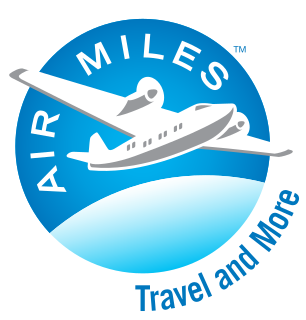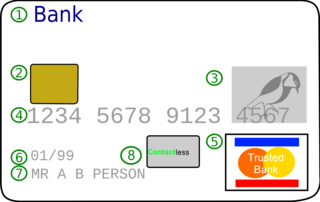A debit card is a payment card that can be used in place of cash to make purchases. It is similar to a credit card, but unlike a credit card, the money for the purchase must be in the cardholder's bank account at the time of a purchase and is immediately transferred directly from that account to the merchant’s account to pay for the purchase.
Air Canada is the flag carrier and the largest airline of Canada by fleet size and passengers carried. Air Canada maintains its headquarters in Montreal, Quebec. The airline, founded in 1937, provides scheduled and charter air transport for passengers and cargo to 207 destinations worldwide. It is a founding member of the Star Alliance. Air Canada's major hubs are at Montréal–Trudeau International Airport (YUL), Toronto Pearson International Airport (YYZ) and Vancouver International Airport (YVR). The airline's regional service is Air Canada Express.

Nectar is a loyalty card scheme in the United Kingdom, run by Nectar 360 Ltd. The scheme is the largest in the United Kingdom, and comprises a number of partner companies including Sainsbury's, Esso and eBay. It launched in 2002 with initially four partner companies, and by 2010 had grown to include over 14 companies and over 400 online retailers. Participating companies cover sectors including travel, retail, finance and newspapers.

A charge card is a type of credit card that enables the cardholder to make purchases which are paid for by the card issuer. The cardholder is obligated to repay the debt to the card issuer in full by the due date, usually on a monthly basis, or be subject to late fees and restrictions on further card use. Charge cards are typically issued without spending limits, but regular credit cards usually have a specified credit limit that the cardholder may not exceed. Most charge cards are business and corporate charge cards, not personal charge cards. Charge cards are issued to customers with good or excellent credit score.
Discover is a credit card brand issued primarily in the United States. It was introduced by Sears in 1985. When launched, Discover did not charge an annual fee and offered a higher-than-normal credit limit, features that were disruptive to the existing credit card industry. A subsequent innovation was "Cashback Bonus" on purchases.
Diners Club International (DCI), founded as Diners Club, is a charge card company owned by Discover Financial Services. Formed in 1950 by Frank X. McNamara, Ralph Schneider, Matty Simmons, and Alfred S. Bloomingdale, it was the first independent payment card company in the world, and it established the concept of a self-sufficient company producing credit cards for travel and entertainment. Diners Club International and its franchises serve individuals from around the world with operations in 59 countries.

Bankcard was a shared brand credit card issued by financial institutions in Australia and New Zealand between 1974 and 2006. It was managed by the Bankcard Association of Australia, a joint venture of Australia's largest banks, and was the nation's first mass market credit card.
Aeroplan is a coalition loyalty program owned by Air Canada, Canada's flag carrier. The Aeroplan program was created in July 1984 by Air Canada as an incentive program for its frequent flyer customers. In 2002 it was spun off as a separate corporate entity and eventually sold to Aimia. On May 11, 2017, Air Canada announced it plans to launch a new loyalty program to replace the Aeroplan program in 2020. On August 21, 2018, Air Canada, along with TD, CIBC and Visa, agreed to acquire Aeroplan from Aimia for CA$450 million in cash. There are approximately 5 million active members in the program. On August 11, 2020, Air Canada released details about its new loyalty program, which was a relaunch of Aeroplan.

Air Miles are separately operated loyalty programs in Canada, the Netherlands and the Middle East. Points are earned on purchases at participating merchants and can be redeemed against flights with specific airlines.

Dynamic currency conversion (DCC) or cardholder preferred currency (CPC) is a process whereby the amount of a credit card transaction is converted at the point of sale, ATM or internet to the currency of the card's country of issue. DCC is generally provided by third party operators in association with the merchant, and not by a card issuer, such as Visa or Mastercard. Card issuers permit DCC operators to offer DCC in accordance with the card issuers’ processing rules. However, using DCC, the customer is usually charged an amount in excess of the transaction amount converted at the normal exchange rate, though this may not be obviously disclosed to the customer at the time. The merchant, the merchant's bank or ATM operator usually impose a markup on the transaction, in addition to the exchange rate that would normally apply, sometimes by as much as 18%.
An acquiring bank is a bank or financial institution that processes credit or debit card payments on behalf of a merchant. The acquirer allows merchants to accept credit card payments from the card-issuing banks within an association. The best-known (credit) card associations are Visa, MasterCard, Discover, China UnionPay, American Express, Diners Club, Japan Credit Bureau and Indian Rupay.
Discover Financial Services is an American financial services company that owns and operates Discover Bank, which offers checking and savings accounts, personal loans, home equity loans, student loans and credit cards. It also owns and operates the Discover and Pulse networks, and owns Diners Club International. Discover Card is the third largest credit card brand in the United States, when measured by cards in force, with nearly 50 million cardholders. Discover is currently headquartered in the Chicago suburb of Riverwoods, Illinois.
A payment card number, primary account number (PAN), or simply a card number, is the card identifier found on payment cards, such as credit cards and debit cards, as well as stored-value cards, gift cards and other similar cards. In some situations the card number is referred to as a bank card number. The card number is primarily a card identifier and does not directly identify the bank account number/s to which the card is/are linked by the issuing entity. The card number prefix identifies the issuer of the card, and the digits that follow are used by the issuing entity to identify the cardholder as a customer and which is then associated by the issuing entity with the customer's designated bank accounts. In the case of stored-value type cards, the association with a particular customer is only made if the prepaid card is reloadable. Card numbers are allocated in accordance with ISO/IEC 7812. The card number is usually prominently embossed on the front of a payment card, and is encoded on the magnetic stripe and chip, but may be imprinted on the back of the card.

Credit card fraud is an inclusive term for fraud committed using a payment card, such as a credit card or debit card. The purpose may be to obtain goods or services or to make payment to another account, which is controlled by a criminal. The Payment Card Industry Data Security Standard is the data security standard created to help financial institutions process card payments securely and reduce card fraud.

A credit card is a payment card issued to users (cardholders) to enable the cardholder to pay a merchant for goods and services based on the cardholder's accrued debt. The card issuer creates a revolving account and grants a line of credit to the cardholder, from which the cardholder can borrow money for payment to a merchant or as a cash advance. There are two credit card groups: consumer credit cards and business credit cards. Most cards are plastic, but some are metal cards, and a few gemstone-encrusted metal cards.
Card schemes are payment networks linked to payment cards, such as debit or credit cards, of which a bank or any other eligible financial institution can become a member. By becoming a member of the scheme, the member then gets the possibility to issue cards or acquire merchants operating on the network of that card scheme. Visa and MasterCard are two of the largest global brands, known as card schemes, or card brands. Billions of transactions go through their cards on a yearly basis.

Rede known as Redecard is a Brazilian multi-brand acquirer with 25 brands in its portfolio, for credit, debit and benefit cards. Its activities include merchant acquiring, capturing, transmission, processing and settlement of credit and debit card transactions, prepayment of receivables to merchants, rental of POS terminals, check verification through POS terminals, credit card machine and the capture and transmission of transactions using benefit-voucher, private-label cards and loyalty programs such as Multiplus. The company is the first largest in its sector. The company was traded in BM&F Bovespa and disclosed in 2012, 24, September.
A card-not-present transaction is a payment card transaction made where the cardholder does not or cannot physically present the card for a merchant's visual examination at the time that an order is given and payment effected. It is most commonly used for payments made over Internet, but also mail-order transactions by mail or fax, or over the telephone.

A card security code is a series of numbers that, in addition to the bank card number, is embossed or printed on a card. The CSC is used as a security feature for card not present transactions, where a personal identification number (PIN) cannot be manually entered by the cardholder. It was instituted to reduce the incidence of credit card fraud.
Aimia is an investment holding company with a focus on long-term investments in public and private companies, on a global basis, through controlling or minority stakes, and is based in Montreal, Quebec, Canada. It is publicly listed on the Toronto Stock Exchange.









